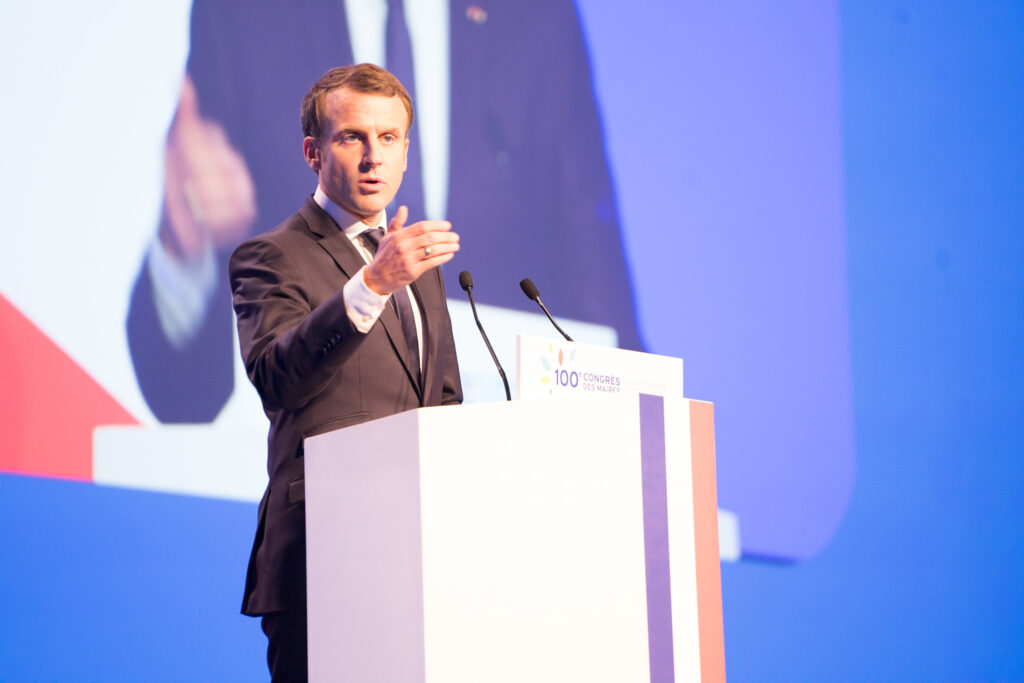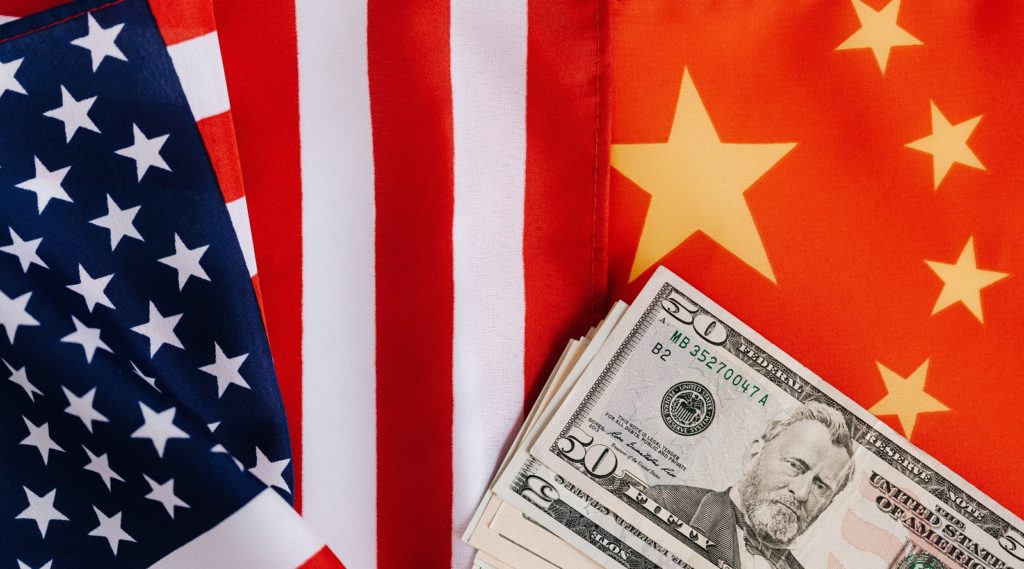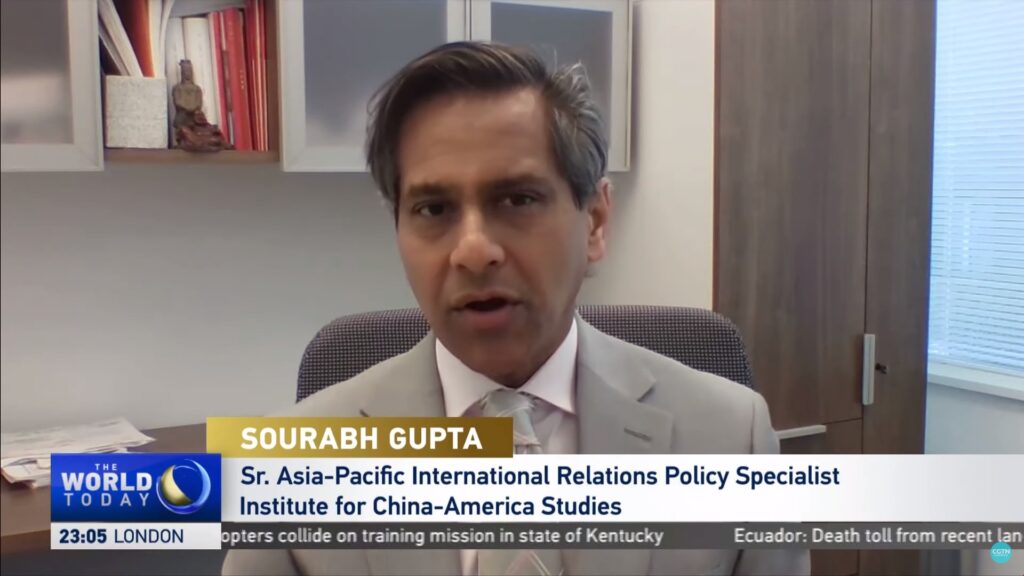
ICAS Bulletin (online ISSN 2836-3418, print ISSN 2836-340X) is published every other week throughout the year at 1919 M St NW, Suite 310, Washington, DC 20036.
The online version of ICAS Bulletin can be found at chinaus-icas.org/bulletins/.

– On April 5, U.S. Speaker of the House Kevin McCarthy met with Taiwanese President Tsai Ing-wen in California, marking the highest-level U.S. official meeting with a Taiwanese president on American soil in decades. Among other issues, the two discussed the rapidly increasing tensions between mainland China and Taiwan.
– In response to Tsai’s visit, a spokesperson of China foreign ministry denounced the McCarthy-Tsai meeting, stating that the U.S. was on a “wrong and dangerous road” and China would take “resolute and forceful measures to defend national sovereignty and territorial integrity.”
– Soonafter, the Chinese People Liberation Army sent in 71 warplanes off the coast of Taiwan to provide a “serious warning against the ‘Taiwan independence.’”
– The Chinese government also imposed sanctions on Hsiao Bi-khim, Taiwan’s equivalent to an ambassador to the U.S., prohibiting her and her family from visiting mainland China.
– President Tsai Ing-wen defied China’s threats before her meeting with House Speaker McCarthy to assert Taiwan’s sovereignty, attracting pro- and anti-Taiwan demonstrators to gather outside of Tsai’s hotel in Los Angeles.
– China warned U.S. House Speaker Kevin McCarthy not to meet Taiwan’s leader Tsai Ing-wen in consideration of regional peace and stability.
– The day before President Tsai visited with Speaker McCarthy, Tsai met with a group of U.S. senators in New York, showing support for the island’s democracy and promoting sanctions against China in case of a military conflict.
– Taiwan’s leader Tsai Ing-wen arrived in New York on March 29 amid threats from Beijing that American politicians engaging with her could lead to retaliation.
– Taiwan is pushing for a tax deal with the U.S. to eliminate double taxation on firms, but such an agreement may escalate tensions with China.
Associated News References:
“China sends 71 warplanes near Taiwan as military drills kick off,” The Japan Times, April 8 [Paywall]
“China imposes sanctions on Taiwan’s US envoy, institutions,” Reuters, April 7 [Paywall]
“U.S. Speaker meets Taiwan leader and stresses need to speed up arms deliveries,” Reuters, April 6 [Paywall]
“China denounces U.S.-Taiwan meeting, vows ‘forceful measures’,” PBS News, April 6
“U.S. Tensions With China on Display as McCarthy Hosts Taiwan’s Leader,” The New York Times, April 5 [Paywall]
“Taiwan defies China pressure before US House speaker meeting,” AP News, April 5
“China warns US House Speaker not to meet Taiwan president,” Reuters, April 4 [Paywall]
“Taiwan’s President Quietly Met With U.S. Senators Ahead of Kevin McCarthy Sit-Down,” The Wall Street Journal, April 4 [Paywall]
“Taiwan’s President Lands in the U.S. Amid Threats From China,” The Wall Street Journal, March 29 [Paywall]
“Taiwan Is Pushing Biden for a Tax Deal That Could Infuriate China,” Bloomberg, March 29 [Paywall]

– Tesla CEO Elon Musk stated that Tesla is looking to expand in China and build a new factory to produce 10,000 batteries yearly in Shanghai. The U.S. House congressional committee on China announced serious concern for the new factory, calling for an investigation into Tesla’s federal tax breaks and access to the Chinese market.
– European plane maker Airbus will double production capacity in China, while other multinational companies such as Apple rethink their production lines in China.
– Chinese auto-parts manufacturers may be following in Apple’s footsteps by seeking to establish offshore factories in Indonesia and Vietnam after years of lockdowns and rising trade tensions.
– Beijing petitioned the World Trade Organization to review chip export restrictions from the U.S., Japan and the Netherlands.
– China has begun conducting a review of U.S. chip maker Micron Technology in order to “safeguard the security of the information infrastructure supply chain,” as explained by the Chinese Foreign Ministry.
– Huawei’s recently released annual profit reports showed a nearly 70 percent drop in annual profits in 2022, as the effects of U.S. sanctions begin to show.
– The Walt Disney Company. laid off more than 300 streaming-based employees in Beijing, as a part of a larger restructuring effort.
– Apple CEO Tim Cook met with Chinese Minister of Commerce, Wang Wentao to discuss the stabilization of the technology industry, despite Apple urging suppliers to look elsewhere for production sources.
– New studies by Chinese scientists challenge the U.S. team’s “shocking” claim of superconductivity at usable temperatures.
Associated News References:
“Elon Musk: Tesla to build new battery factory in Shanghai,” BBC News, April 10
“US House committee chair ‘concerned’ by Tesla deals in China,” Reuters, April 10 [Paywall]
“China Auto-Parts Makers Join Apple in Offshore Factory Push,” Bloomberg, April 10 [Paywall]
“Airbus to Build New China Jet Factory as Apple Pulls Back,” Bloomberg, April 6 [Paywall]
“China seeks WTO review of chip export restrictions led by US,” South China Morning Post, April 5 [Paywall]
“Micron Technology: China probes US chip maker for cybersecurity risks as tech tension escalates,” CNN News, April 3
“The other Chinese apps taking the US and UK by storm,” BBC News, April 3
“Micron Gets Caught in U.S.-China Crossfire,” The Wall Street Journal, April 3 [Paywall]
“Huawei reports biggest profit decline ever as U.S. sanctions, pandemic controls hit Chinese giant” CNBC News, March 31
“Disney Lays Off More Than 300 Streaming-Focused Employees in China,” The Wall Street Journal, March 29 [Paywall]
“Apple CEO Tim Cook meets with China’s commerce minister on supply chain,” CNBC News, March 27
“More China scientists challenge superconductor bombshell from US team,” South China Morning Post, March 27

– French President Emmanuel Macron has received strong criticism after he stated that Europe cannot become a “vassal” and must not be pulled into the increasing U.S.-Chinese tensions.
– The U.S. Trade Representative Katherine Tai says that the U.S. is adopting trade strategies with U.S. allies to counter China’s rise and its increasing takeover of the global economy.
– Former Taiwanese president Ma Ying-jeou spoke out about how cross-strait relations are at a worrying level, citing Covid-19 as a fundamental reason.
– Chinese Premier Li Qiang publicly announced that China will continue to be an “anchor for world peace and development” as concerns build around a possible conflict with Taiwan.
– The Saudi Arabian government is noticeably strengthening its ties with China as its relations with the U.S. begin to deteriorate.
– U.S. Chairman of the Joint Chiefs of Staff General Mark Milley stated that war with China and Russia is “neither inevitable nor imminent.”
– Chinese Premier Li Qiang made statements saying that Asia must stray away from “chaos and conflicts” or the future of the region will be lost.
– Indian Army Chief Manoj Pande warned that increasing U.S.-China rivalries could lead to further Chinese-India border conflicts.
– China’s global campaign to win friends at local levels has come under fire by the U.S. Justice Department for its involvement with Utah officials in an effort for China to enhance its image.
Associated News References:
“Macron sparks anger by saying Europe should not be ‘vassal’ in US-China clash,” The Guardian, April 10
“Biden Trade Chief Says US Working With Allies to Counter China,” Bloomberg, April 5 [Paywall]
“Cross-strait hostility at worrying level, Taiwan’s Ma Ying-jeou tells top mainland China official,” South China Morning Post, March 30 [Paywall]
“China Seeks to Reassure CEOs as Worries Swirl Over Potential War,” Bloomberg, March 30 [Paywall]
“China’s premier warns against ‘chaos and conflicts’ in Asia,” Al Jazeera, March 30
“Saudi Arabia Strengthens Relations With China Amid Strained U.S. Ties,” The Wall Street Journal, March 29 [Paywall]
“Milley Says War With China, Russia Not Inevitable,” U.S. Department of Defense, March 29
“Great Power Rivalry May Fan China Border Spat: India Army Chief,” Bloomberg, March 28 [Paywall]
“Amid strained US ties, China finds unlikely friend in Utah,” AP News, March 27

– U.S. Treasury Undersecretary Jay Shambaugh stated on Bloomberg TV that the U.S. is not seeking to decouple from China and that both countries should cooperate on global issues.
– Zambia’s president warns that “all parties…[are] not to make Zambia pay a price for a bigger debate,” with debt restructuring as the focus of the ongoing International Monetary Fund and World Bank Spring Meetings.
– China’s state-owned telecom companies are constructing a $500 million undersea fiber-optic internet cable network to rival a similar U.S.-backed project, heightening tech tensions between the two countries.
– The International Monetary Fund warns that rising U.S.-China tensions could cause a 2% loss of global output, making emerging markets particularly vulnerable to changes in foreign investment due to geopolitics.
– Proposals to restrict Chinese purchases of American farmland are gaining traction in 27 U.S. states as lawmakers seek to demonstrate their toughness towards China.
– China’s yuan gains ground in Brazil as Beijing seeks de-dollarization and avoids financial isolation amidst U.S. decoupling, but limited convertibility and Beijing’s capital controls hinder its expansion.
– A former U.S. Commerce Department official sees wider sanctions against China to close loopholes, stating that there is “[n]o line to be drawn” in the tech war, especially regarding semiconductor technology.
Associated News References:
“Top Treasury Official Says US Not Seeking China Decoupling,” Bloomberg, April 10 [Paywall]
“Debt Standoff Between China and U.S. Hurts Poor Countries, Zambia’s President Warns,” The Wall Street Journal, April 10 [Paywall]
“China plans $500 million subsea internet cable to rival US-backed project,” Reuters, April 6 [Paywall]
“IMF says U.S-China tensions could cost the world about 2% of its output,” CNBC News, April 6
“Heartland lawmakers push bans on Chinese purchases of American farms,” The Washington Post, April 4 [Paywall]
“China’s yuan makes Brazilian inroads, as ‘de-dollarisation reflects cracks’ in US currency settlements,” South China Morning Post, April 3 [Paywall]
“’No line to be drawn’ in tech war with China, says former Commerce Department BIS official,” Digitimes Asia, March 24

– Mexico’s president asked his Chinese counterpart to assist in stopping Chinese chemicals used by Mexican drug dealers to illegally produce fentanyl. The Chinese government denied that the country had involvement in any illegal fentanyl drug trafficking with Mexico, with the foreign ministry spokesman saying the U.S. “should face up to its own problems.”
– The U.S. House of Representatives voted unanimously in a challenge to China’s international status as a ‘developing nation,’ an appointment which allows for special trade and low-interest loans.
– Top U.S. lawmakers overseeing the Department of Homeland Security have called for hearings to investigate Chinese software that runs over 80% of U.S. port cranes.
– U.S. Undersecretary of State for economic growth and energy, Jose Fernandez, spoke in-favor of the U.S. policies towards the Chinese government, citing that they were necessary to create a “level playing field.”
Associated News References:
“China: We’re Still a Developing Nation. US Lawmakers: No Way,” Voice of America, April 8
“China denies fentanyl trafficking with Mexico; blames US,” ABC News, April 6
“Mexico asks China’s help in curbing production of fentanyl,” AP News, April 4
“Congress Seeks Details on Spying Risks From Chinese Cargo Cranes,” The Wall Street Journal, April 3 [Paywall]
“US Says Tough China Moves Needed to Counter ‘National Champions’,” Bloomberg, April 3 [Paywall]
“USF joins Florida colleges in blocking TikTok from being used on campus,” 10 Tampa Bay, April 5
“China watches Trump courtroom drama: A ‘premium show without paywall’,” The Washington Post, April 5 [Paywall]
“Philippines, U.S. hold biggest-ever drills to counter China,” Nikkei Asia, April 11
“Le Maire Says EU Must Not Be Pushed Around in US-China Rivalry,” Bloomberg, April 11 [Paywall]
“ChatGPT pushes US, China to take similar precautions on AI accountability,” South China Morning Post, April 11 [Paywall]
“Korean Air, Japanese Airlines Could Benefit From Limits on U.S.-China Flights,” Airline Weekly, April 10
“Chinese Solar Maker Says US May Be Too Pricey for Expansion,” Bloomberg, April 9 [Paywall]
“Intel officials watching for signs Russia, China are trying to exploit Trump indictment to widen U.S. political divide,” NBC News, April 4
April 11 hosted by Wilson Center
April 10 hosted Center for Strategic and International Studies
April 4 hosted by United States Heartland China Association
March 29 hosted by Center for Strategic and International Studies
April 12 hosted by Wilson Center
April 13 hosted by U.S.-China Economic and Security Review Commission
April 20 hosted by The China Project
April 20 hosted by Center for Strategic and International Studies
Roles of Asian Observers in Arctic Governance: Adapting to a Changing Arctic Council
Thursday, April 13, 2023
9:30 AM – 11:00 AM EST
Climate change has increased accessibility to potential Arctic resources, changing the geopolitical landscape and broadening the international focus on the Arctic to include more geographically distant countries such as China, Japan, South Korea, India, and Singapore. Seeking observer status in the Arctic Council is regarded by these Asian countries to be an important step towards ensuring that they are involved in determining the future of the Arctic; a region which they believe will influence their economic interests and global environmental concerns.
Triggered by the Ukraine conflict, the March 2022 joint statement by the Arctic Council states to pause participation in all meetings of the Arctic Council indicates grave impediments to international cooperation in the Arctic. So long as this statement is in play, the premier forum for Arctic governance, which tended to be immune from geopolitical tensions, can no longer function in its consensus-based format. This subsequently opened up an ongoing debate on the future of the Arctic Council.
What does the suspension of the Arctic Council meetings mean for Arctic Council observers? Will Norway, who will take over the chairmanship in May 2023, make any progress to break through the current ties? Will the debate on the concept of an “Arctic Council 2.0” gain support among non-Arctic states who have a deep interest in Arctic governance? Will non-Arctic countries such as China, Japan, South Korea, India, and Singapore — which have growing Arctic interests and have contributed much to Arctic research —welcome the opportunity for them to establish a more solid role in this region’s affairs? How will the observers adapt to a changing Arctic Council?
This event, co-organized by the China Institute of the University of Alberta, will bring together scholars from the five Asian observers of the Arctic Council, China, Japan, South Korea, India, and Singapore to exchange their views on this critical issue.
The Fight for Representation: The State of Chinese Americans Survey
Thursday, April 27, 2023
7:00 pm EDT
Chinese Americans are historically underrepresented in politics and policy, and underserved in healthcare, education, and social services. How do you work to solve these problems?
The first step is getting clear and concise data on Chinese Americans, one of the fastest growing populations in the U.S.
Chinese Americans have diverse backgrounds and diverse needs – from culture, family, healthcare, education, employment, finances and political engagement. Data disaggregation is the key to addressing the issues, concerns and challenges of Chinese Americans.
In the largest survey of its kind ever conducted, nearly 6,500 Chinese Americans from 46 states answered 77 key questions about the Chinese American experience in research conducted jointly by Columbia University and Committee of 100.
This disaggregated data specifically on Chinese Americans will inform policymakers and the public of the diverse set of opinions, perceptions, and needs of Chinese Americans across the country and will help develop timely and responsive policies, programs, and services to address those needs.
Join experts from Columbia University, Committee of 100 and the worlds of policy, politics and research for the unveiling of this data at a virtual town hall on April 27 at 7:00pm ET.
By Alec Caruana
April 10, 2023
Key Takeaways:
By Nong Hong
April 7, 2023
The Commission for the Conservation of Antarctic Marine Living Resources (CCAMLR, hereafter referred to as the Commission) convenes meetings on a range of topics each year. This includes gatherings to discuss the establishment of Marine Protected Areas (MPA) in the Antarctic. In the 41st Meeting of the Commission, held October 24-November 4, 2022, three MPA proposals were brought to the meeting for discussion: Domain 1 MPA (Western Antarctic Peninsula and South Scotia Arc) submitted by Argentina and Chile; East Antarctic MPA submitted by Australia, the European Union and India, New Zealand, Norway, Korea, Ukraine, the United Kingdom, the United States and Uruguay; and the Weddell Sea MPA (WSMPA) submitted by the EU, Norway, Uruguay, Australia, the UK, New Zealand, the U.S., Korea, India and Ukraine. The Commission did not reach consensus on any of the three MPA proposals at this meeting.
The three proposals were supported by most members of the Commission. Russia and China expressed concerns, such as the need for baseline data collection and research and monitoring plans (RMPs) prior to the establishment of a MPA. The United States explicitly stated that it neither currently agrees with all the conclusions nor endorses all the recommendations made by China and Russia regarding MPAs and associated RMPs. The U.S. also called for attention being given to a more constructive dialogue on MPAs and RMPs in the future, starting with a Special Meeting in 2023.
By Sourabh Gupta
April 5, 2023
Key Takeaways:
By Xiaohang Zhou
April 7, 2023
The recent imposition of price caps on Russian oil and petroleum products by the United States, the European Union, other G7 countries, and Australia (a group loosely being referred to as the “Price Cap Coalition”) following Russia’s invasion of Ukraine in February 2022 has sent continuous shockwaves across the global energy market. As net importers of fossil fuels, Asian countries have frequently faced rising costs and supply chain disruptions due to unilaterally or collectively imposed sanctions, which have exacerbated issues like poverty, inequality and climate change…
On Sunday, April 9, 2023, Senior Fellow Sourabh Gupta was quoted in the South China Morning Post on President Macron’s trip to China and EU-China relations.
On Thursday, April 6, 2023, Senior Fellow Sourabh Gupta was quoted in an Inside US Trade article on the restructuring of China’s science and technology ministry.
On Friday, March 31, 2023, Senior Fellow Sourabh Gupta was quoted by the South China Morning Post on the Summit for Democracy and its focus on democratic renewal.
On Thursday, March 30, 2023, Senior Fellow Sourabh Gupta discussed the Boao Forum 2023 on CGTN America’s The Heat.
“…particularly when the conflict in Europe still continues in Ukraine, one cannot discount that these sort of matters could also, at one point in time, come to Asia, that would be very unfortunate. You know, the security infrastructure of Europe has collapsed in the name of 40 million Ukrainians. We don’t want the Asian security architecture to collapse in the name of 23 million Taiwanese…so obviously one cannot discount these fears…”
On Thursday, March 30, 2023, Senior Fellow Sourabh Gupta discussed the US’ One-China Policy and President Tsai’s Travel on CGTN America The World Today.
On Thursday, March 30, 2023, Senior Fellow Sourabh Gupta was interviewed by Xinhua on China’s Global Security Initiative and its relations to global multilateralism.



The Institute for China-America Studies is an independent nonprofit, nonpartisan research organization dedicated to strengthening the understanding of U.S.-China relations through expert analysis and practical policy solutions.
1919 M St. NW Suite 310,
Washington, DC 20036
icas@chinaus-icas.org
(202) 968-0595
© 2024 INSTITUTE FOR CHINA-AMERICA STUDIES. ALL RIGHTS RESERVED.